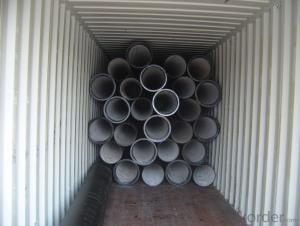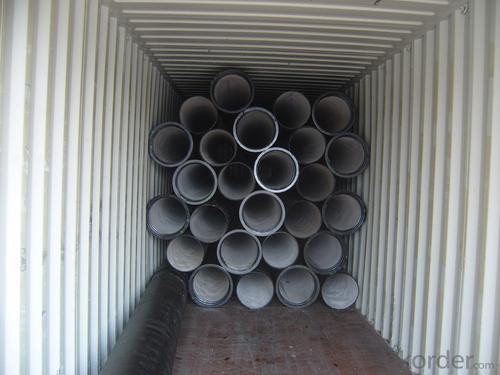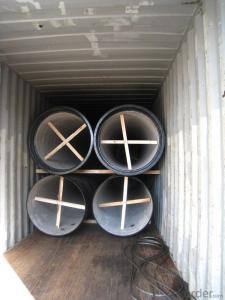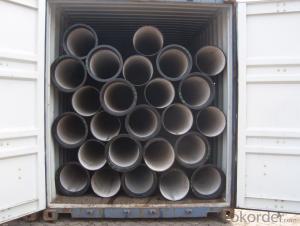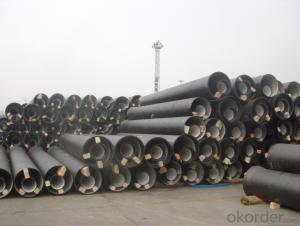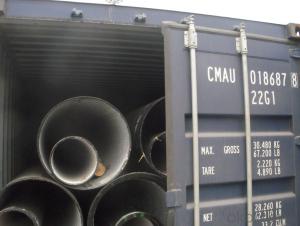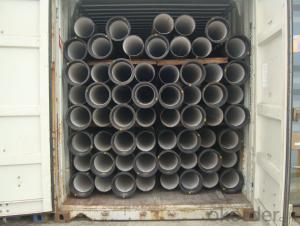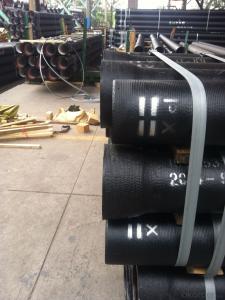DUCTILE IRON PIPES AND PIPE FITTINGS K8 CLASS DN1300
- Loading Port:
- Tianjin
- Payment Terms:
- TT OR LC
- Min Order Qty:
- 22 pc
- Supply Capability:
- 3000 pc/month
OKorder Service Pledge
OKorder Financial Service
You Might Also Like
Material : Ductile Cast Iron
Size Range : DN 80mm to DN 2000mm
Unit Effective Length : 6m or 5.7m
Manufacture Standard: ISO 2531:1998/ EN 545:2006/EN 598:2007
Annual capacity : 200,000 tons
Coating Exterior: Zinc 130g/m2 according to ISO 8179-1 and bitumen coating 70 microns.
Cement Interior: Portland Cement/ High Alumina Cement/ Sulphate Resisting Cement Lining according to ISO 4179
Special requirements on external coating and internal lining can be applied
We also provide accessories such as SBR/EPDM rubber gaskets, lubricant paste, pipe caps, PE sleeves, etc.
Additional Parts:
Each pipe is strictly inspected according to related standard to ensure permanently high performance.
Easy Installation at site and service free for life
Long Service Lifespan
Quotation will arrive you within 24hours once we get your inquiry.
We guarantee offering you a competitive price.
A copy of original inspection reports of pipes will be offered after shipment.
Photos of loading process will be sent to the customer after shipment effect.
We will follow-up the delivery progress after shipment effect and update to the customer on weekly basis.
- Q: Can ductile iron pipe be used for water treatment plants?
- Water treatment plants can utilize ductile iron pipe. This material is frequently employed in the water industry because of its robustness, longevity, and ability to resist corrosion. It is suitable for a range of applications, including the transportation of water within water treatment plants. Ductile iron pipe can withstand high pressure and is particularly well-suited for underground installations. Furthermore, it demonstrates exceptional resistance to corrosion from water and the chemicals frequently employed in water treatment processes. Additionally, ductile iron pipe is straightforward to install and maintain, making it the preferred choice for water treatment plants. All in all, ductile iron pipe is a dependable and cost-effective option for the transportation of water within water treatment plants.
- Q: How do ductile iron pipes handle dynamic loads?
- Ductile iron pipes are known for their exceptional strength and durability, which allows them to effectively handle dynamic loads. These pipes have a high resistance to bending and can withstand the pressure and stress exerted on them when subjected to dynamic loads, such as water hammer or ground movement. The unique composition of ductile iron, which includes a small amount of carbon and the addition of magnesium, creates a structure that is both strong and flexible. This combination enables the pipes to flex under the impact of dynamic loads, rather than fracturing or breaking like other materials. Additionally, ductile iron pipes have a high impact resistance, which means they can absorb and distribute the energy generated by dynamic loads throughout their structure. This ability to dissipate energy helps to minimize the risk of pipe failure and ensures the longevity of the pipeline system. Furthermore, ductile iron pipes have excellent stress distribution properties, which means that the load applied to the pipes is evenly dispersed along their length. This helps to prevent localized stress concentrations and reduces the likelihood of damage or failure. In summary, ductile iron pipes are designed to handle dynamic loads efficiently. Their strength, flexibility, impact resistance, and stress distribution properties make them highly suitable for applications where dynamic loads are a concern, ensuring the reliability and longevity of the pipeline system.
- Q: General cast iron prices now
- Hello friends, Tianjin is in Shandong Qingdao 6500 7300 yuan / ton to 7100 yuan a ton of Zhejiang 7500 to 9000 yuan a ton, this is a great relationship, and the production of raw materials, for reference only, we are ductile casting manufacturers, the information can not say 100% accurate but can reference.
- Q: Can centrifugal cast iron pipe be galvanized or coated with asphalt which is good for corrosion prevention?
- 1, outdoor grounding of anti-corrosion, we must consider the contact resistance, so it is recommended not to use asphalt, and do not use anti-corrosion paint, preferably galvanized anti-corrosion.2, asphalt anti-corrosion paint has good water resistance, moisture resistance, corrosion resistance. Acid and alkali resistance, salt fog resistance, atmospheric exposure and so on. The utility model is suitable for coating internal and external surfaces of various containers and machinery, underground steel structures and underground pipelines for moisture proof, water resistance and corrosion prevention. The utility model is also suitable for repairing water cracks in houses.3, anticorrosive paint is used in the surface of the object, can be used to protect the interior of the object without corrosion of a kind of paint. It is one of the more commonly used than paint anti-corrosion paint in industrial construction, widely used in aviation, shipbuilding, chemical, oil pipelines, steel structures, bridges, oil rigs and other fields, by the vast number of manufacturers favor building.
- Q: What are the interface forms of ductile iron pipes? The best drawings are available. Thank you
- There are many kinds of ductile iron pipe interfaces, and the T type interface (sliding type) flexible interface is famous for its fast installation and simple installation.
- Q: What kind of joints are used with ductile iron pipe?
- Ductile iron pipe typically uses mechanical joints or push-on joints. Mechanical joints consist of a gland and a rubber gasket that are used to connect two pipes together. These joints are secured by bolts or other mechanical means to ensure a tight and secure connection. Push-on joints, on the other hand, do not require any bolts or additional hardware. They simply involve the insertion of a rubber gasket into the socket of the pipe, which creates a sealed connection. Both types of joints are widely used with ductile iron pipe and offer reliable and leak-free connections for various applications.
- Q: Is there a kind of pipe called lined ductile iron pipe? Seeking manufacturers?
- Yes, ductile pipe is divided into two kinds, one is the ductile cast iron pipe pipe socket (socket ductile pipe), which is mainly used for water supply system, namely the fire water, because of ductile iron pipe with pressure, 10kg, 12kg, 16kg. Pressure small price, a few cheaper, because pure in the production process of different, 1. sand mill 2. metal water cooling, like water, the basic is 16kg.
- Q: How are ductile iron pipes different from cast iron pipes?
- Ductile iron pipes are different from cast iron pipes in terms of their composition and properties. Ductile iron pipes are made from a type of cast iron that has been treated with magnesium to improve its strength and flexibility. This makes ductile iron pipes more durable, impact-resistant, and less prone to cracking or breaking compared to traditional cast iron pipes. Additionally, ductile iron pipes have a higher tensile strength, allowing them to withstand higher internal and external pressures. In summary, ductile iron pipes are a more modern and advanced version of cast iron pipes, offering improved performance and longevity.
- Q: What is the expected joint performance of ductile iron pipes?
- The expected joint performance of ductile iron pipes is typically high due to their robustness and durability. The joints are designed to provide a tight and secure connection, ensuring minimal leakage and long-term reliability.
- Q: How do ductile iron pipes handle seismic movements?
- Ductile iron pipes are renowned for their exceptional capacity to handle seismic movements, owing to their distinctive properties and construction. This renders them remarkably resistant to stress and deformation caused by ground vibrations during earthquakes. One of the primary merits of ductile iron pipes lies in their superior tensile strength, enabling them to endure substantial forces without succumbing to breakage or rupture. When seismic movements occur, these pipes exhibit flexibility and absorb the energy generated by the ground vibrations, thereby minimizing the risk of damage or failure. Moreover, ductile iron pipes possess exemplary resilience, allowing them to revert to their original shape after being subjected to external forces. This characteristic empowers the pipes to adapt to ground movements during earthquakes, effectively diminishing the likelihood of fractures or leaks. Furthermore, ductile iron pipes boast considerable ductility, enabling them to deform without fracturing. This attribute proves crucial during seismic events, as it enables the pipes to absorb the energy generated by ground vibrations by deforming and subsequently returning to their original shape once the seismic activity subsides. In order to further enhance their capacity to handle seismic movements, ductile iron pipes are frequently designed and installed with flexible joints. These joints grant the pipes the ability to move and adjust to ground movements, offering additional safeguards against damage or failure. In conclusion, ductile iron pipes have demonstrated their extraordinary reliability and resilience in withstanding seismic movements. Their combination of high tensile strength, resilience, and ductility make them an optimal choice for regions prone to earthquakes, ensuring the safety and durability of fluid transportation systems.
Send your message to us
DUCTILE IRON PIPES AND PIPE FITTINGS K8 CLASS DN1300
- Loading Port:
- Tianjin
- Payment Terms:
- TT OR LC
- Min Order Qty:
- 22 pc
- Supply Capability:
- 3000 pc/month
OKorder Service Pledge
OKorder Financial Service
Similar products
Hot products
Hot Searches
Related keywords
